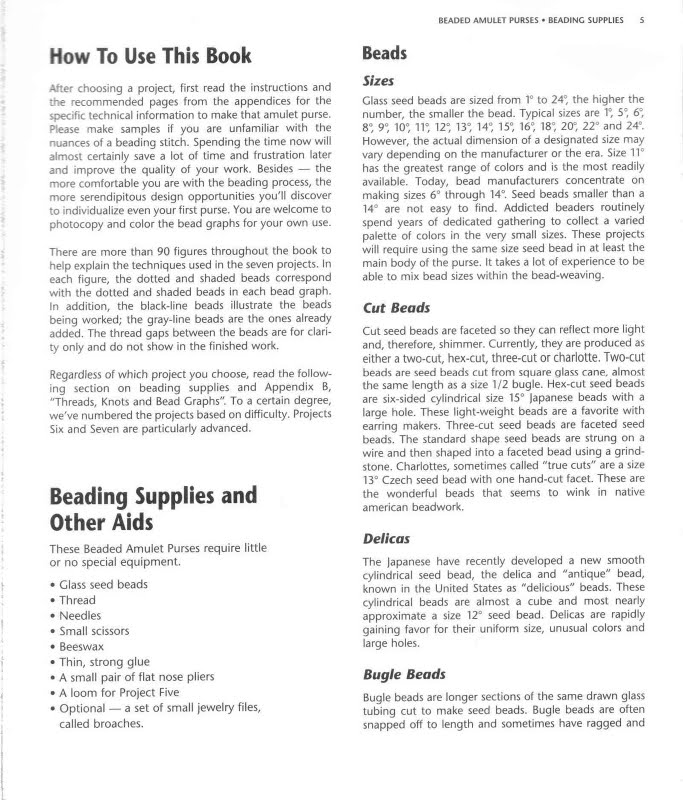05

BEADED AMULET PURSES • BEADING SUPPLIES 5
How To Use This Book
After choosing a project, first read the instructions and the recommended pages from the appendices for the specific technical information to make that amulet purse. Please make samples if you are unfamiliar with the nuances of a beading stitch. Spending the time now will almost certainly save a lot of time and frustration later and improve the quality of your work. Besides — the morę comfortable you are with the beading process, the morę serendipitous design opportunities you'll discover to individualize even your first purse. You are welcome to photocopy and color the bead graphs for your own use.
There are morę than 90 figures throughout the book to help explain the techniques used in the seven projects. In each figurę, the dotted and shaded beads correspond with the dotted and shaded beads in each bead graph. In addition, the black-line beads illustrate the beads being worked; the gray-line beads are the ones already added. The thread gaps between the beads are for dari-ty only and do not show in the finished work.
Regardless of which project you choose, read the follow-ing section on beading supplies and Appendix B, "Threads, Knots and Bead Graphs". To a certain degree, we've numbered the projects based on difficulty. Projects Six and Seven are particularly advanced.
Beading Supplies and Other Aids
These Beaded Amulet Purses require little or no special equipment.
• Glass seed beads
• Thread
• Needles
• Smali scissors
• Beeswax
• Thin, strong glue
• A smali pair of fiat nose pliers
• A loom for Project Five
• Optional — a set of smali jeweiry files, called broaches.
Beads
Sizes
Glass seed beads are sized from T to 24°, the higher the number, the smaller the bead. Typical sizes are T, 55, 6* 8°, 9°, 10°, 11* 12°, 13°, 14°, 15°, 16°, 18c, 20' 22° and 24°. However, the actual dimension of a designated size may vary depending on the manufacturer or the era. Size 11° has the greatest rangę of colors and is the most readily available. Today, bead manufacturers concentrate on making sizes 6° through 14°. Seed beads smaller than a 14° are not easy to find. Addicted beaders routinely spend years of dedicated gathering to collect a varied palette of colors in the very smali sizes. These projects will require using the same size seed bead in at least the main body of the purse. It takes a lot of experience to be able to mix bead sizes within the bead-weaving.
Cut Beads
Cut seed beads are faceted so they can reflect morę light and, therefore, shimmer. Currently, they are produced as either a two-cut, hex-cut, three-cut or Charlotte. Two-cut beads are seed beads cut from sguare glass cane. almost the same length as a size 1/2 bugle. Hex-cut seed beads are six-sided cylindrical size 15° Japanese beads with a large hole. These light-weight beads are a favorite with earring makers. Three-cut seed beads are faceted seed beads. The standard shape seed beads are strung on a wire and then shaped into a faceted bead using a grind-stone. Charlottes, sometimes called "true cuts" are a size 13° Czech seed bead with one hand-cut facet. These are the wonderful beads that seems to wink in nalive american beadwork.
Delicas
The japanese have recently developed a new smooth cylindrical seed bead, the delica and "antique" bead, known in the United States as "delicious" beads. These cylindrical beads are almost a cube and most nearly approximate a size 12* seed bead. Delicas are rapidly gaining favor for their uniform size, unusual colors and large holes.
Bugle Beads
Bugle beads are longer sections of the same drawn glass tubing cut to make seed beads. Bugle beads are often snapped off to length and sometimes have ragged and
Wyszukiwarka
Podobne podstrony:
BEADED AMULET PURSES • BEADING SUPPUES 7 japanese beading needles are one diameter only and the size
BEADED AMULET PURSES • PROIECT SEVEN i ) Figurę 4 To make the triangular points at the top of the pu
let s cut paper00 How to use this book ’Keła mul rnjov.f Kumon’s First Steps Workbooks are designed
How to use this book B Iłem (o ciił with .scissors Show your child how to cut along the designated l
BEADED AMULET PURSES • PROJECT ONE 11 To make the strap. Think oł the strap as a necklace. Choose th
BEADED AMULET PURSES • PROIECT THREE 17 Sections to be read before beginning: • Tu
IS rRO)£CT THREE • BEADED AMULET PURSES To apply edge bcading to the ribbon. After the ribbon is sti
BEADED AMULET PURSES • PROJECT SIX 31 Sections to read before beginning: •
BEADED AMULET PURSES • PROJECT SIX 33 To add the fringes to the edges. Add two-bead fringes between
10 PROJECT ONE • BEADED AMULET PURSES Figurę 4 To outline the hearts at the top rim. Begin a new thr
BEADED AMULET PURSES • PROJECT TWO 1J Sectlons to read before beginning: •
więcej podobnych podstron